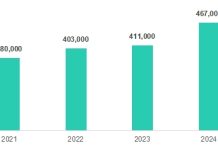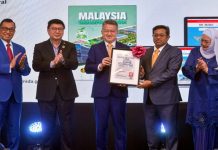Malaysia has entered a landmark partnership with carbon market associations from nine ASEAN nations through the signing of a Memorandum of Cooperation (MOC) to establish the ASEAN Common Carbon Framework (ACCF).
As the world’s third-largest trader, Malaysia’s commitment to this agreement aims to enhance carbon market efficiencies across Southeast Asia, advance green finance, and bolster ASEAN’s global competitiveness.
This collaboration aligns with Malaysia’s preparations for its ASEAN Chairmanship in 2025 and reinforces the country’s goal to reduce carbon emission intensity by 45% by 2030 (from 2005 levels).
Malaysia’s Minister of Natural Resources and Environmental Sustainability, Nik Nazmi Nik Ahmad, highlighted the importance of the ACCF, stating that “this collaboration reflects Malaysia’s growing recognition of the urgency to address climate change” and “aims to unlock carbon project opportunities unique to ASEAN, building an integrated, efficient, and credible carbon market for the region.”
With a population exceeding 600 million, ASEAN is currently the world’s fifth-largest economy, with a combined GDP of US$3.8 trillion as of 2023, and is projected to become the fourth-largest by 2030. Through a unified carbon market, the ASEAN partnership seeks to attract global attention, expanding the supply and demand for carbon credits and fostering a cohesive carbon ecosystem that supports the region’s green finance objectives.
This initiative promises a transformative role in regional carbon generation and trading by standardising frameworks across ASEAN nations, enhancing market transparency and efficiency, and reinforcing Malaysia’s ambition to become an “Epicentrum of Growth” in Southeast Asia.
By aligning carbon trading regulations and mechanisms, Malaysia and its ASEAN partners intend to amplify regional cooperation, strengthen green value chains, and fulfil each country’s Nationally Determined Contributions (NDCs).
In a milestone achievement, COP29 negotiators reached consensus on standards for an international carbon market under Article 6.4 of the Paris Agreement. These standards set a centralised framework for carbon credit trading, aiming to reduce global emissions affordably while directing financial resources towards developing nations, potentially saving up to US$250 billion annually in climate action costs.
The Malaysia Pavilion at COP29, led by the Ministry of Natural Resources and Environmental Sustainability (NRES) in partnership with the Malaysian Green Technology and Climate Change Corporation (MGTC), is supported by organisations such as Tenaga Nasional Berhad (TNB), PETRONAS, Malaysian Palm Oil Council (MPOC), and others, showcasing Malaysia’s commitment to sustainable development and climate action. For more details, visit Malaysia Pavilion COP29.















